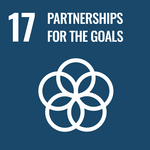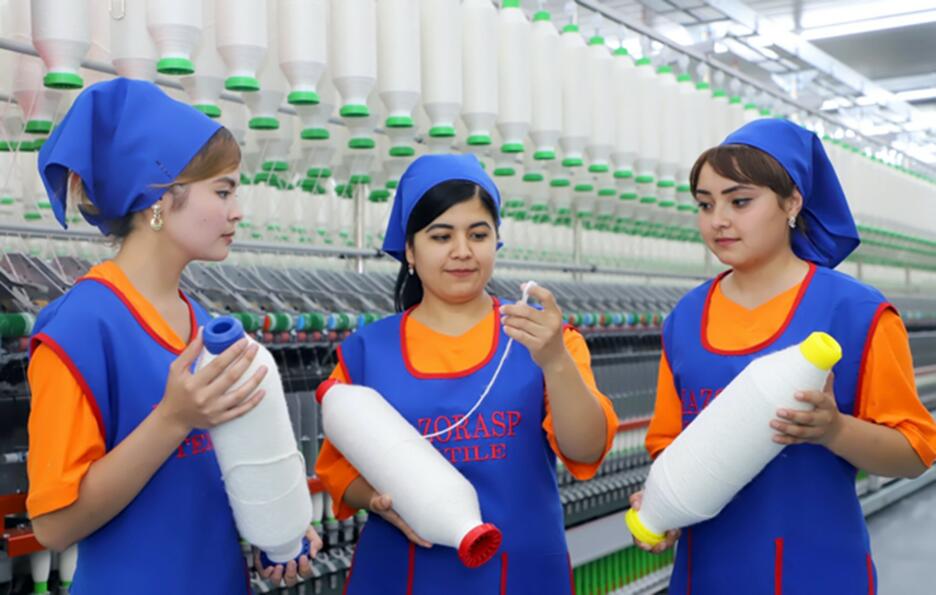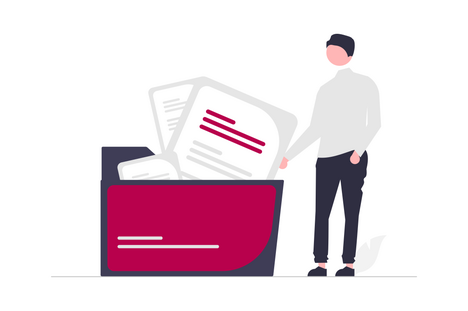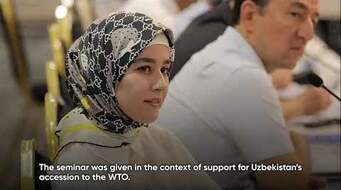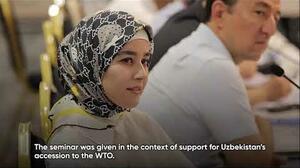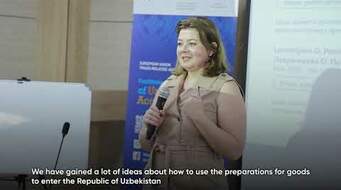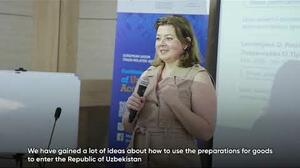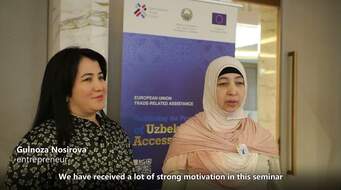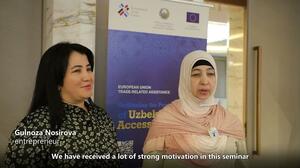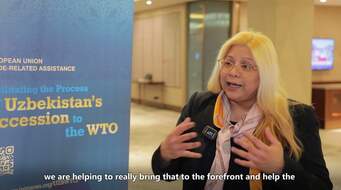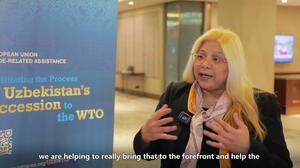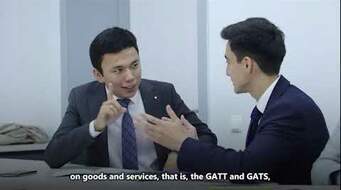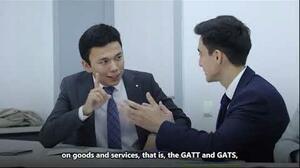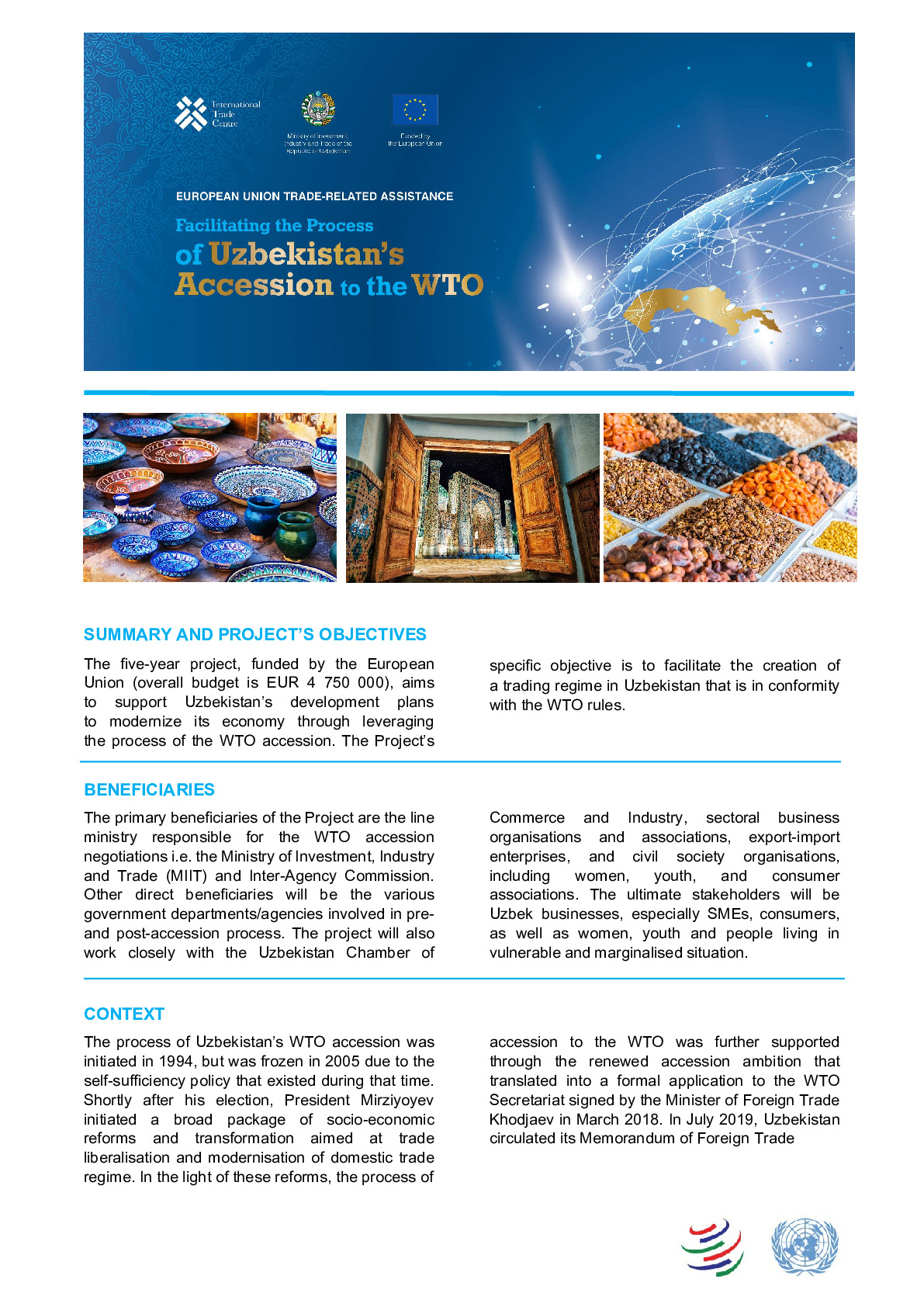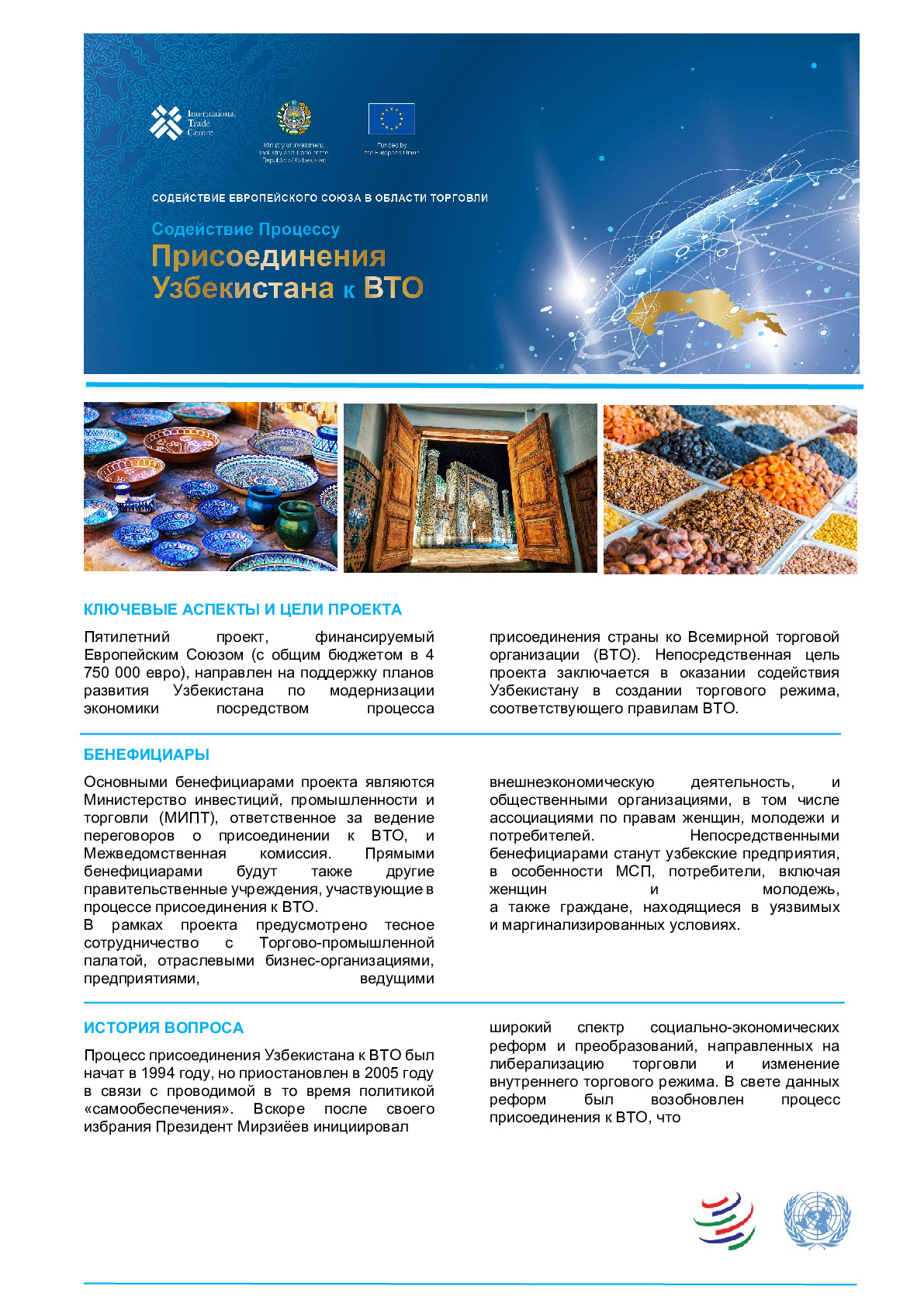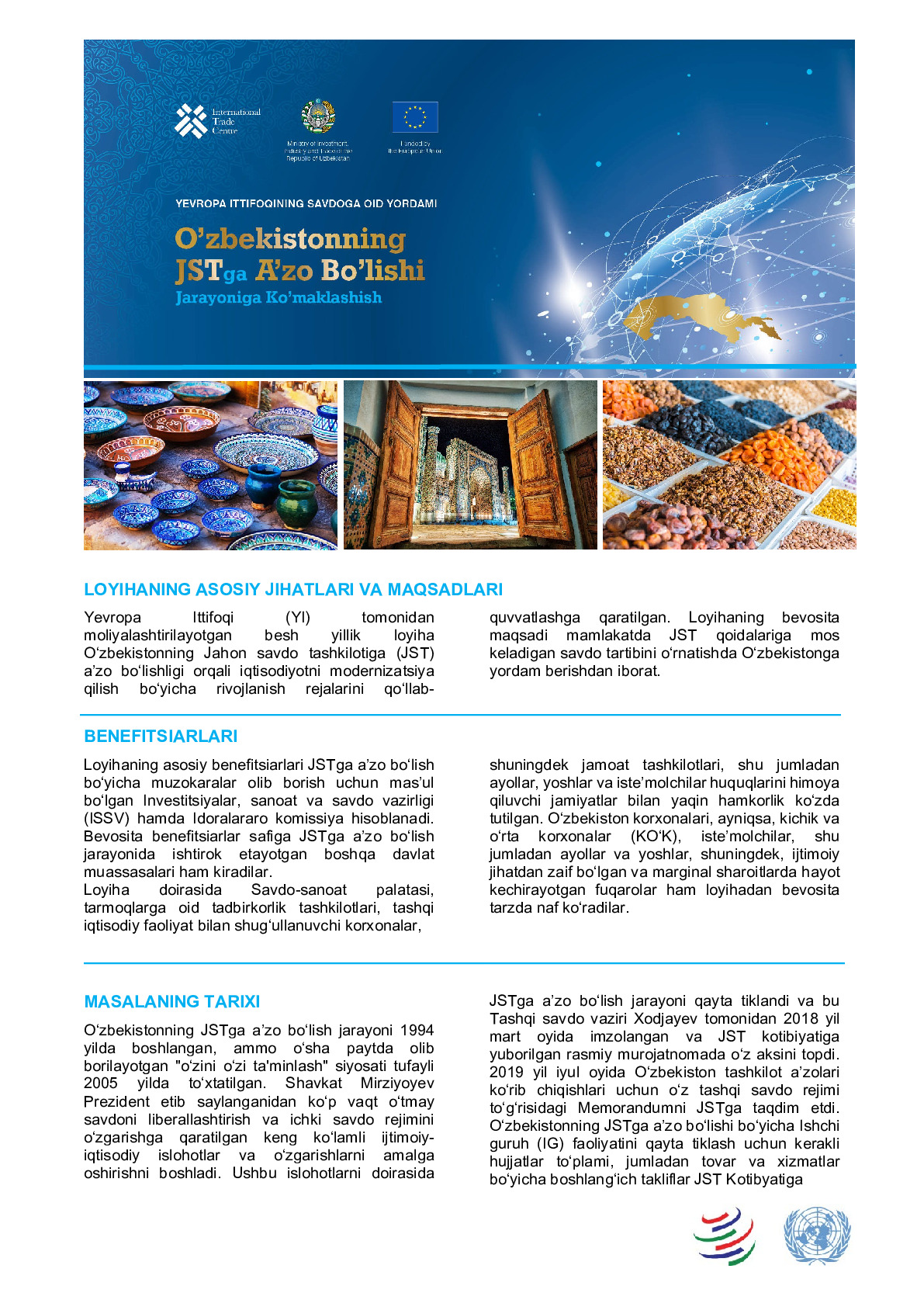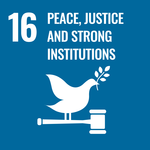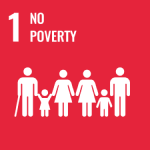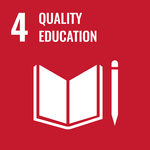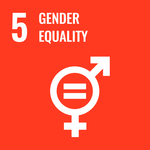Uzbekistan
OIC: Trade and market intelligence for ICDT
Sustainable Development Goals
<p>The project will strengthen ICDT services on trade intelligence to support the public and private sector from the Organisation of Islamic Cooperation (OIC) to make better informed decisions and, in the long term, to contribute to an increase of trade between OIC Member States through the embedding of Market Analysis Tools, the development of an online Trade Helpdesk and the development of trade-related studies.</p>
Uzbekistan: Facilitating the Process of Accession to the WTO
Our quarterly newsletter in English, Russian and Uzbek updates beneficiaries and interested parties on the progress made in Uzbekistan's World Trade Organization accession process. The newsletter also serves businesses and women and youth groups.
The project focuses on five areas for Uzbekistan to negotiate WTO accession commitments and to put in place the mechanisms to put them into practice.
Practical assistance with draft documentation and negotiation stances is provided to support Uzbekistan’s team at the WTO negotiating table.
The legislative and executive branches are equipped to develop and manage specific regulation that ensures national laws are aligned with WTO obligations.
The project assists with developing policymakers’ understanding of the accession process and the WTO’s legal framework to create an enabling policy environment.
Institutional capacity is developed to foster practical know-how that has to be applied in specific trade-related areas, such as trade facilitation, technical barriers to trade and health and safety standards related to trade in agricultural goods, which are administered through the WTO’s sanitary and phytosanitary measures.
Lastly, the project engages the private sector in a comprehensive awareness-raising campaign to ensure that local businesses, including women’s associations, understand and can benefit from the liberalization of the business environment.
This multi-pronged approach aims to contribute to the smooth transition to, and integration of Uzbekistan into, the global economy. The process aims to create a stable and predictable policy environment that will encourage more investment, boost employment creation and stimulate the overall economic welfare of the country to the benefit of its population.
Sustainable Development Goals
<p>The ‘<em>Facilitating the process of Uzbekistan’s accession to the WTO</em>’ project was set up to support Uzbekistan's development plans by assisting the country’s decision to integrate into the world economy through membership of the World Trade Organization. The project commenced in February 2020 with funding from the European Union and is implemented by the International Trade Centre (ITC). It is set to run for five-year period.</p><p>The guiding objective of the project is to contribute to the economic development of Uzbekistan. The country will be assisted to create a trade environment that conforms with international rules and standards and help it to maintain predictable and enforceable laws and regulations. In this manner the economy will become modernized and integrated into the global economy, and thereby attract investment, create employment and stimulate economic development.</p><p>Practically, the Uzbekistan Government will be equipped to draft the documents and develop its negotiating positions as required by the WTO accession process.</p><p>The executive and legislative branches will be better informed to develop specific sectoral<strong> </strong>laws and regulations as needed to comply with Uzbekistan's new international commitments.</p><p>Policymakers’ understanding of the WTO accession process and its legal framework will be reinforced.</p><p>In this manner the country’s capacity to comply with WTO rules will be developed, notably in the areas of standards, agricultural export requirements and trade facilitation.</p><p>In addition, the project will keep the private sector informed about the WTO accession process and its effects and benefits.</p>
Poor Communities and Trade Programme
Sustainable Development Goals
<p>Poor Communities and Trade Programme (PCTP), at the International Trade Centre (ITC), aims to reduce global poverty by strengthening the capacities of developing country micro-entrepreneurs, social enterprises and emerging designers for export trade, in order to connect them with international buyers, in the value chain of ethical fashion, through an inclusive business model.</p><p>PCTP provides technical expertise and business support to informal micro-enterprises and to emerging designers, through a business support infrastructure (based on hubs managed by social enterprises) that enables them to acquire capacities to set up and manage production and quality control systems, logistics and supply chain management, market identification and buyer negotiation skills. This market-based approach to poverty reduction provides micro-entrepreneurs form the informal sector (for the majority women) with the direct benefits of trade by creating jobs and facilitating business opportunities resulting in increased incomes, improved livelihoods and new linkages to the formal economy.</p><p>Within its social enterprises around the world, ITC’s Ethical Fashion Initiative (EFI) in <u><strong>2019 </strong>focus on the following deliverables<strong>:</strong></u></p><ul><li><strong><strong>Living wage assessments are carried out in 8 project countries</strong></strong></li><li><strong>African Fashion Fund in collaboration with the Ethical Fashion Initiative </strong></li><li><strong><strong>New business model, based on online trade is developed and launched</strong></strong></li><li><strong>Events in coordination with the UN Alliance for Sustainable Fashion are organised</strong></li><li><strong>Generating awareness on the impacts of climate change and conflicts affecting livelihoods of people in selected project countrie</strong></li></ul><p><strong><u>In 2020</u></strong> the Initiative will focus on the following deliverables:</p><p><span style="font-weight: 700;"><strong>Output 3.1: Accelerator launched with six African designers 4 of which are from countries not involved in the existing project frameworks of the EFI (expansion of EFI’s network and creation of new opportunities for intra-African trade). </strong></span></p><p><span style="font-weight: 700;">Output 3.2: <strong>Eritrea project framework tested through preliminary activities, designed and submitted </strong></span></p><p>In 2021</p>





